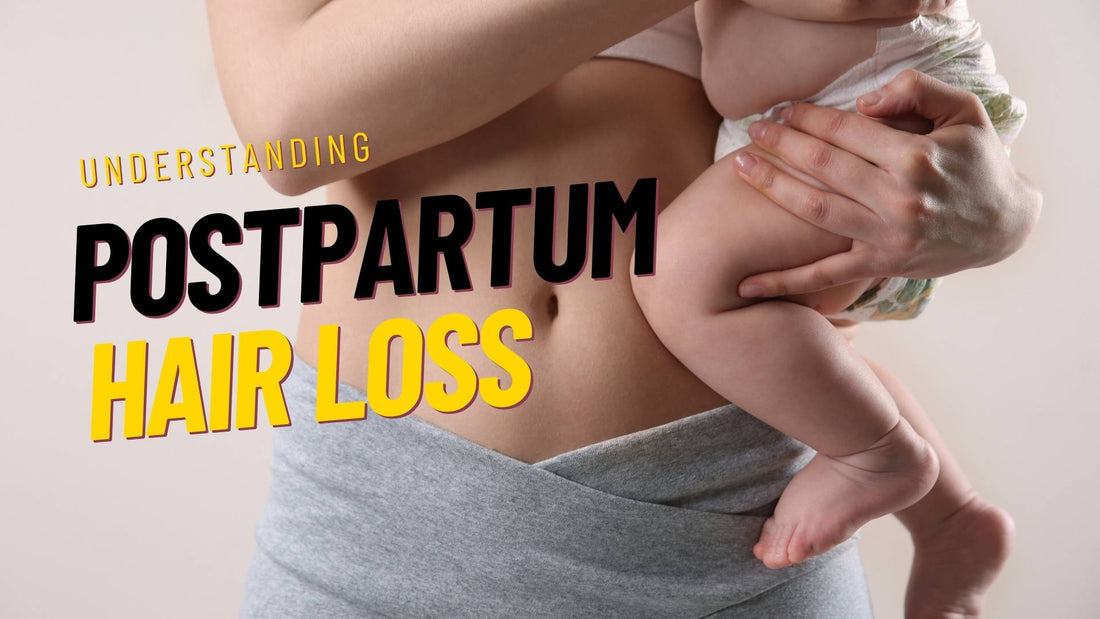The postpartum period brings a whirlwind of emotions and adjustments.
One unexpected (and sometimes alarming) change for new moms can be hair loss.
Yes, you read that right – hair loss can be expected after childbirth.
This blog post will explain why this happens, what to expect, and how to navigate this temporary blip in your luscious locks.
The Postpartum Shedding Spree: Why New Moms Lose Hair
During pregnancy, a surge of hormones, particularly estrogen, keep your hair follicles in a constant growth phase, leading to thicker, fuller hair for many women.
However, after delivery, those hormone levels take a dramatic plunge.
This sudden drop disrupts the hair growth cycle, pushing many follicles into the resting phase, ultimately leading to hair shedding.
When Does Postpartum Hair Loss Happen? Don't Panic Yet!
The good news is that postpartum hair loss is usually temporary.
It typically starts around 3-4 months after giving birth and can last anywhere from 6 to 12 months.
You might notice more hair coming out when brushing or showering or even see some thinning on your scalp.
Is It Hair Loss or Something Else? When to See a Doctor
While postpartum hair loss is average, it's always a good idea to talk to your doctor if you're experiencing excessive shedding or have concerns.
They can rule out other underlying medical conditions that might be causing hair loss.
Coping with Postpartum Hair Loss: Tips for Maintaining Your Mane
Here are some tips to manage postpartum hair loss and keep your hair healthy:
- Be gentle: Avoid harsh styling products, tight hairstyles, and excessive heat styling.
- Focus on scalp care: A healthy scalp promotes healthy hair growth. Use a gentle shampoo and conditioner suitable for your hair type.
- Embrace low manipulation styles: Opt for braids, buns, or headbands that put less stress on your hair.
- Nourish from within: Ensure a balanced diet rich in vitamins and minerals that support hair health, like iron, biotin, and protein.
- Manage stress: Stress can exacerbate hair loss. Practice relaxation techniques like yoga or meditation.
- Talk to your doctor: Discuss your concerns and explore options like prenatal vitamins or hair loss supplements (with your doctor's approval).
Postpartum hair loss is a common experience for new moms.
While it can be frustrating, it's important to remember that it's temporary. Focus on self-care, prioritize your well-being, and embrace the beautiful journey of motherhood.
And hey, those lost strands will likely be back before you know it!
Our team comprises certified cranial prosthesis specialists meticulously trained to ensure a perfect fit for your wig.
This translates to a natural-looking solution that empowers you to feel your best.
We boast a diverse selection of high-quality wigs, offering a variety of styles, materials, and colors to cater to your unique needs and preferences.
Navigating insurance coverage for wigs can be complex. However, our team possesses the expertise to guide you through the process, maximizing your coverage potential.
Most importantly, we prioritize personalized care and support throughout your experience.
At Wig Medical, we actively listen to your concerns, address your questions, and provide expert guidance every step of the way.
Top Five Things You Need to Know about Postpartum Hair Loss
When does postpartum hair loss start, and how long does it last?
Most women begin to notice hair shedding about three to four months after giving birth.
The condition can last anywhere from six months to a year but typically peaks around the four-month mark.
The timing and duration can vary based on individual hormonal changes.
Is postpartum hair loss preventable?
While postpartum hair loss itself cannot be prevented because it is due to hormonal changes, women can take steps to minimize the impact and promote healthy hair growth.
These steps include eating a balanced diet rich in vitamins and minerals, avoiding stress, and being gentle with hair care (avoiding tight hairstyles, harsh chemicals, and excessive heat).
What are the best ways to manage postpartum hair loss?
Managing postpartum hair loss involves both caring for your hair and supporting overall health:
- Nutrition: Eating a diet high in fruits, vegetables, proteins, and omega-3 fatty acids can help support hair growth.
- Hair Care: Use a volumizing shampoo, avoid heavy conditioners, and try not to use heat stylers. Soft hair accessories can minimize pulling and stress on your hair.
- Supplements: Supplements like biotin, vitamin D, and zinc can also support hair health, but it's important to consult with a healthcare provider before starting any new supplement, especially if breastfeeding.
Will my hair return to normal after postpartum hair loss?
Yes, for most women, hair returns to its pre-pregnancy state.
As the body gradually adjusts back to its hormonal baseline, hair follicles recover from the resting phase and begin to grow new hair.
Full recovery can take up to a year after the onset of shedding.
Are there any treatments or products specifically recommended for postpartum hair loss?
While postpartum hair loss is generally a temporary phase that resolves on its own, there are products and treatments that can help manage the symptoms and promote healthy hair growth:
- Topical Treatments: Minoxidil (Rogaine) is a topical treatment that can be applied to the scalp to stimulate hair growth. However, it’s important to consult with a healthcare provider before using it, especially if breastfeeding.
- Shampoo and Conditioner: Look for hair products labeled as "volumizing" or those containing ingredients like biotin, keratin, and zinc, which can strengthen hair and improve its appearance.
- Scalp Treatments: Light scalp massages with essential oils such as peppermint or rosemary oil can improve blood circulation and encourage hair growth. Always dilute essential oils with a carrier oil and check for allergies before use.
- Hair Styling Tips: Avoiding tight hairstyles and minimizing the use of heat styling tools can help reduce hair breakage and loss.
Let us know in the comments below!

